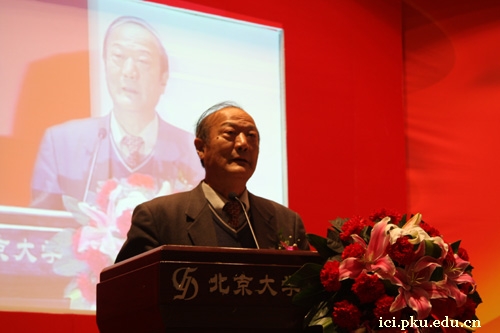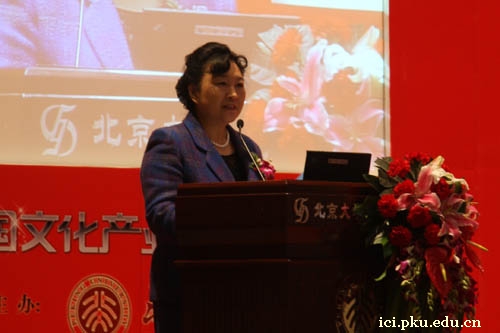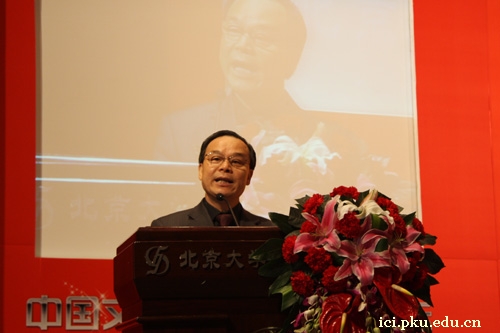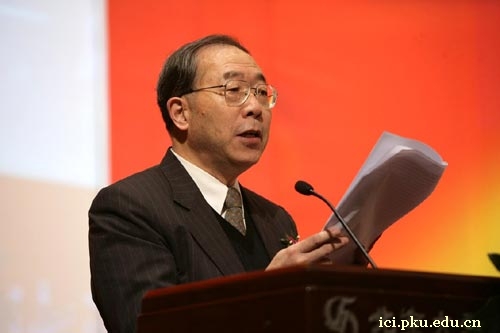|
The ongoing world financial crisis could be a perfect opportunity for China to develop its culture and innovation industry as people turn away from the disappointing material world and seek satisfaction and fulfillment in culture-related products.
More than 800 scholars, government officials and businessmen discussed how China could use such an opportunity to its advantage at the 6th New Year Forum of International Cultural Industries China 2009, which kicked off on Saturday at Peking University in Beijing.
As the worldwide economic downtown slows China's exports and shakes its manufacturing industry, people have more free time than before as well as the need to satisfy themselves in a way that the real world cannot provide. Instead, they have turned to buying products and services in the culture industry, which includes designing, the arts, filmmaking and home entertainment such as PCs and online games.

Li Wuwei, Vice-chairman of the Chinese People's Political Consultative Conference, speaks at the 2009 China New Year Forum of International Cultural Industries on Saturday, January 10, 2009. [Photo: CRIENGLISH.com]

Zhao Shaohua, Vice Minister of Culture, speaks at the 2009 China New Year Forum of International Cultural Industries on Saturday, January 10, 2009. [Photo: CRIENGLISH.com]

Zhou Qifeng, President of Peking University, delivers a welcome speech at the 2009 China New Year Forum of International Cultural Industries on Saturday, January 10, 2009. [Photo: CRIENGLISH.com]

Ye Lang, Dean of Peking University's Institute for Cultural Industries, delivers a welcome speech at the 2009 China New Year Forum of International Cultural Industries on Saturday, January 10, 2009. [Photo: CRIENGLISH.com]

Chen Shaofeng, Vice-dean of Peking University's Institute for Cultural Industries, speaks at the 2009 China New Year Forum of International Cultural Industries on Saturday, January 10, 2009. [Photo: CRIENGLISH.com]
"The world financial meltdown has brought people more pressure as they worry about the future, and people need something to relieve this pressure, said Li Wuwei, Vice-chairman of the Chinese People's Political Consultative Conference, in a speech at the forum."The culture and creative industry, such as online gaming, always caters to people's spiritual demands. It can provide them with happiness at a relatively low cost."
The culture industry, which is based on knowledge and creativity, features relatively low input but high added value and efficiency compared with traditional industries, Li said.
In recent years, the cultural and creative industry in some large Chinese cities has had a much faster growth rate than traditional industries. Central Government data show that the growth rate of revenue from the innovation industry of Beijing, Shanghai and Shenzhen in 2007 was 19.4, 22.8 and 25.9 percent, respectively, while their GDP growth rates were 12.3, 13.3 and 15 percent.
Besides being a profitable industry itself, the culture and creative industry also can build up the country's cultural image, or soft power, which could have a huge positive effect on the real economy. Li cited South Korea as an example.
"After the South Korean film, TV and pop music industries emerged from the debris of the 1990s' economic crisis, the South Korean government invested in them and sponsored all the subtitle translation projects to export its soap operas to neighboring countries," Li said. "The well-received South Korean TV soap operas created a trend in Asia in South Korea's favor, and thus gave impetus to South Korea's exports and tourism."
But experts at the forum also pointed out that China must do several things well before it can fully take advantage of developing its culture and creative industry. Chen Shaofeng, Vice-dean of Peking University's Institute for Cultural Industries, suggested that the Central Government implement more favorable policies for small enterprises, the mainstay of the culture and creative industry.
"I think the Central Government should reform the enterprise registration system to lower the threshold for opening businesses," Chen said. "We could reduce the amount of capital required to register a company."
Many other steps, such as lowering the threshold of initial public offerings for small innovative enterprises, also could be taken to help finance them to grow, he said.
"We should also respect the copyrights of our cultural products," said Zhang Zhizhong, Executive Vice-President of the Greater China Region of the Walt Disney Co. "With that achieved, we will see more creative ideas come into being in the future."
|

















